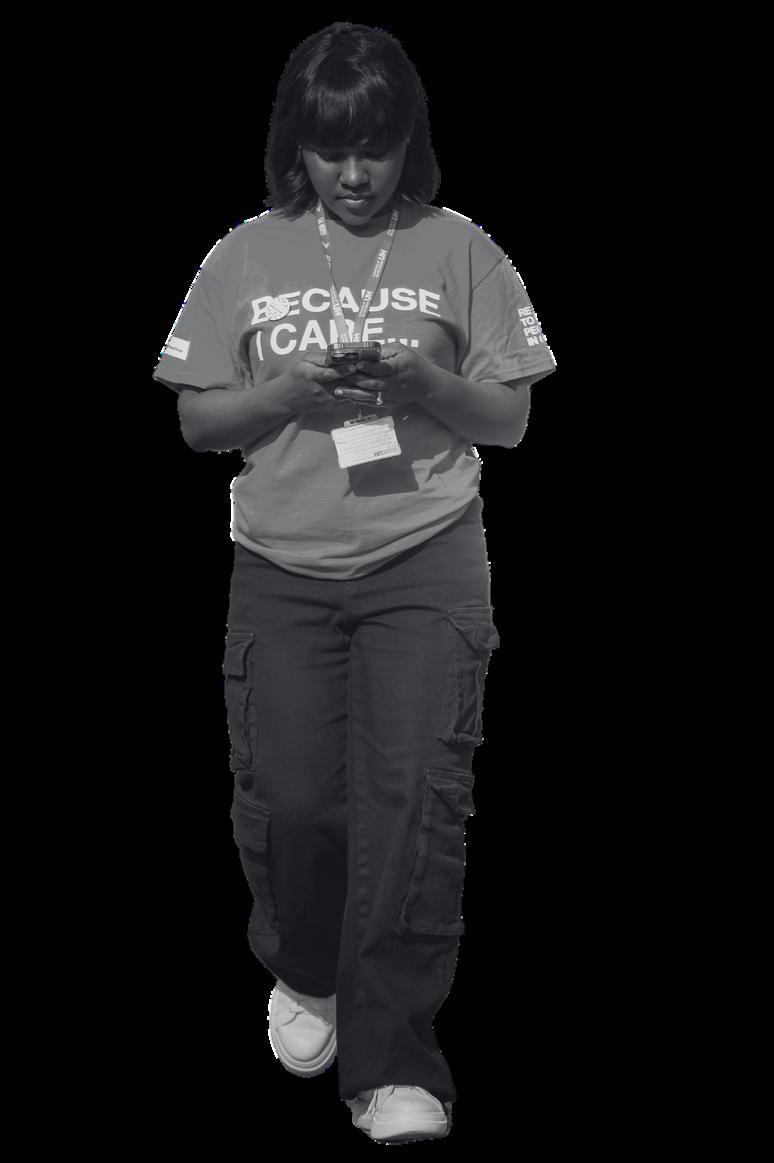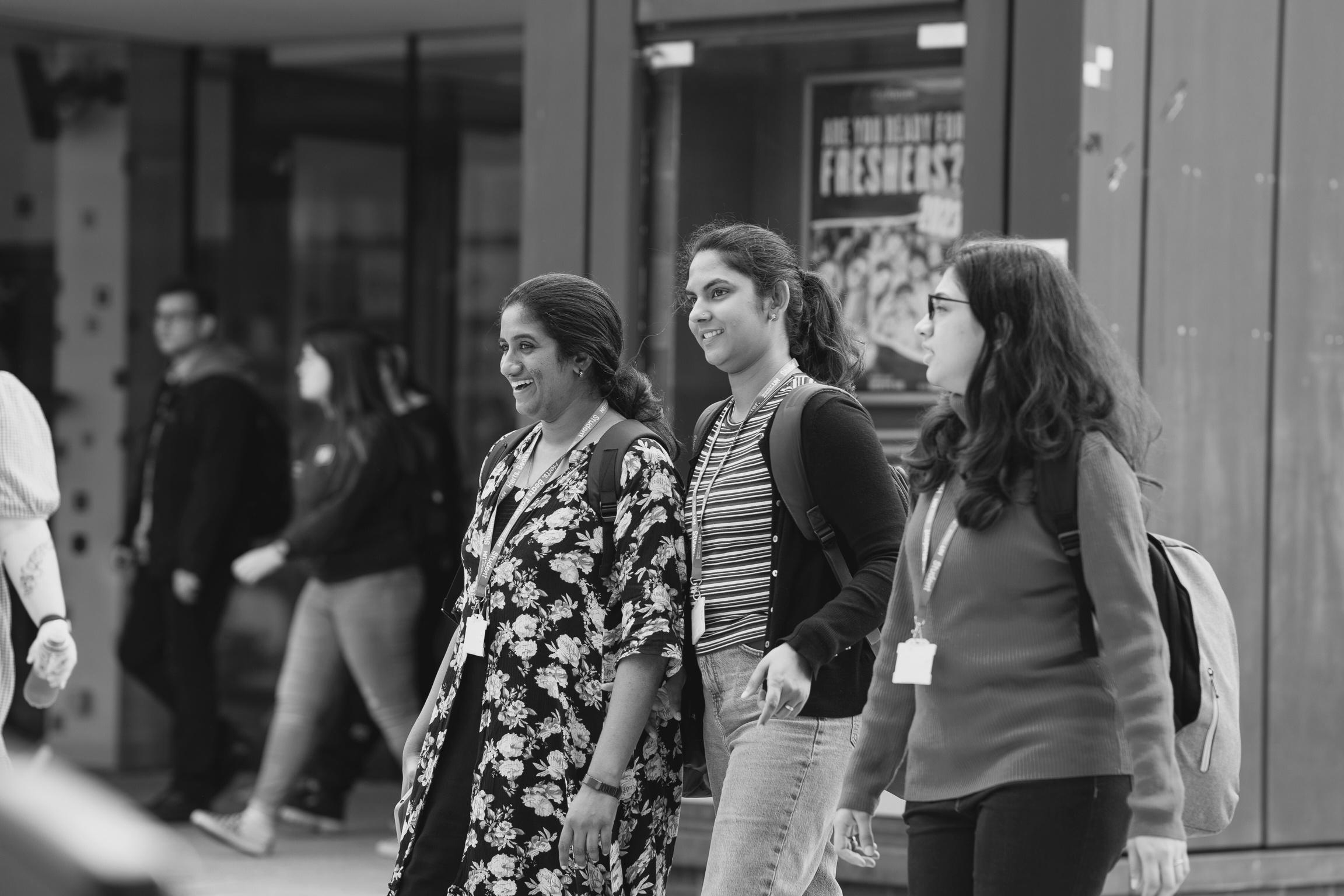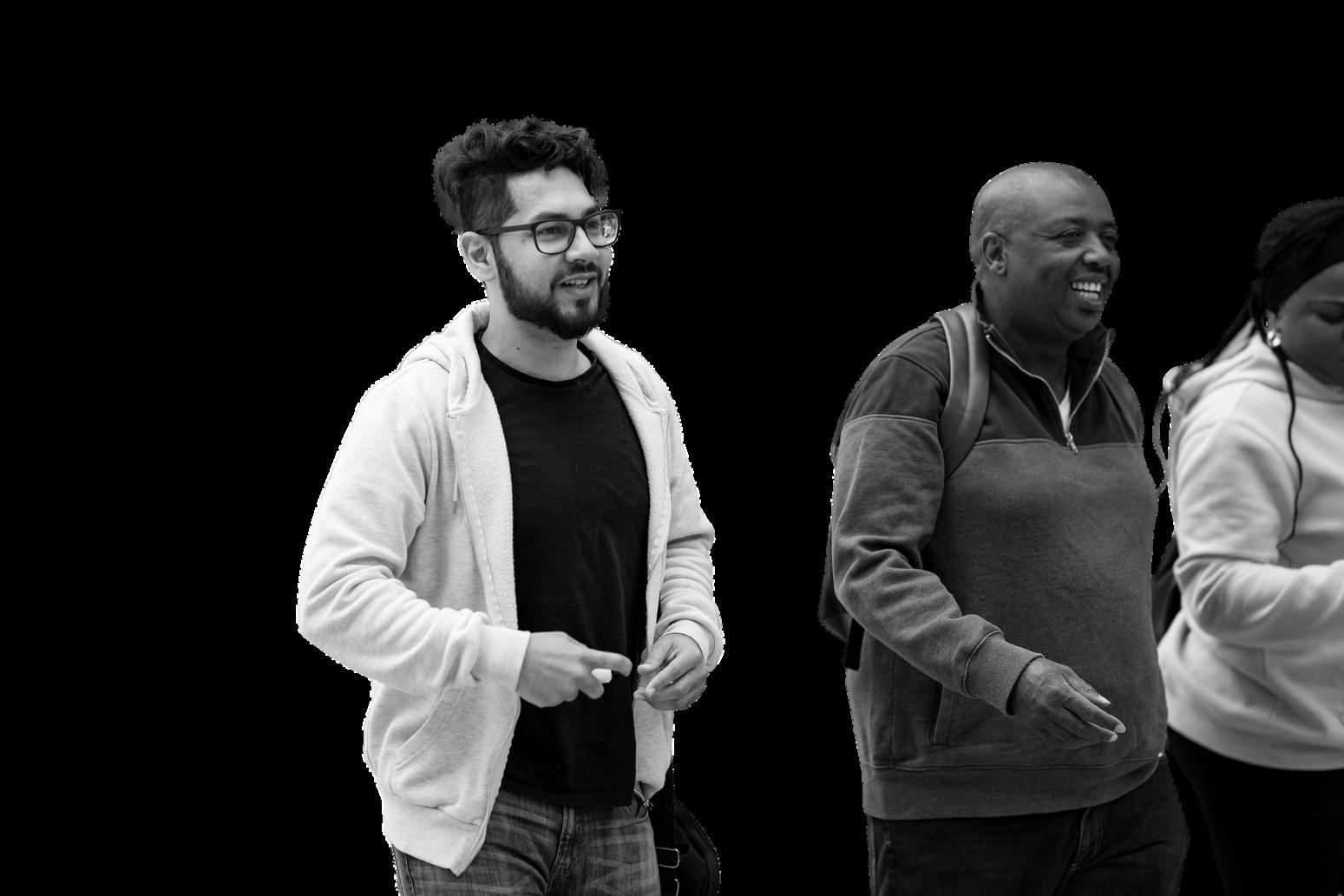STARTOFTERM SURVEY








The Start of Term Survey examined 1,256 student responses from October to November 2023. The respondents had recently joined the university and were asked how they felt about their experience. The survey focused on areas like pre-arrival information,registration,FreshersWeek,support,facilitiesandresources.
Fromthe1,256respondents,989wereinternational students(79%),whilsthomestudentswere underrepresented(21%,N=267/1,256).40%(N= 504/1,256)ofsurveyresponsescamefrom HertfordshireBusinessSchoolstudentsand20% (22%,N=276/1,256)ofresponsescamefromSchool ofPhysics,EngineeringandComputerScience students.Thesurveyreceivedthelowestnumberof responsesfromSchoolofCreativeArtsstudents (7%,N=94/1,256)
71%ofsurveyrespondentsclassifiedthemselves ascommutingstudents,withthemostpopular transportmethodfortravellingtouniversity beingviabus(53%,N=469/884),followedby train(24%,N=215/884)andwalking(12%,N= 107/884).Commutingtouniversityviacarwas onlychosenby10%ofrespondentswhoclassified themselvesascommutingstudents.52%of commutingstudentssurveyedtravelledfor60 minutesorless(eachway)togettouniversity, whiletheremaindertravelledforlonger,with14% (N=424/884)ofcommutingstudentssurveyed travellingformorethantwohourseachway.
Whenaskedabouthobbiesandinterests,themostcommoninterestwassportsand fitness (25%, N = 288/1165), followed by travelling (19%, N = 222/1165) and social activities (12%, N = 141/1165). When asked what they were most looking forward to at Herts, only 8% (N = 92/1165) of survey respondents reported to be most looking forwardto“makingfriends”.Thehighestresponseswerefor“academiclearningand education” (33%, N = 381/1165), followed by “professional development” (27%, 314/1165)and“gainingnewexperiences”(25%,295/1165)
Pre-arrivalinformationfocusesonwhattypeofinformationstudentsreceivedbefore theyarrivedattheuniversity.Thisincludedinformationaroundfindinghousing,parttimejobs,timetablesandtransportto-and-fromtheuniversitycampuses.
Overall,77%(N=855/1,111)ofstudentsfeltthattheywerewellinformedabouthowto find housing, rising to 80% of international student respondents reporting that they feltwellinformedaboutthis(N=702/877).However,thisdropstoasignificantlylower proportionofhomestudentrespondents(65%,N=153/234,P<0.05).
Overall,only50%(N=549/1,095)ofrespondentsfeltwellinformedabouthowtofind part-timejobs.Thisroseto53%(N=457/884)forinternationalstudentrespondents anddroppedto40%(N=92/231)forhomestudentrespondents.Commutingstudent respondents reported feeling better informed than non-commuting respondents aroundhowtofindpart-timework(55%vs.39%respectively),with76%(N=603/792) ofcommutingstudentrespondentsreportingthattheyhadbeennotifiedabouttheir timetable. Meanwhile, only 66% (N= 207/313) of non-commuting respondents reportedthattheyhadbeensuppliedwiththisinformation.
When respondents were asked if they were aware of their programme leaders and academic staff on their course, 63% (N= 147/235) of home student respondents statedthattheyhadbeenmadeaware.However,thisresponsedroppedto55%(N= 490/883) from international student respondents. Moreover, international student respondents reported that the information they received before arriving at the university was useful (93%, N = 818/884), which was significantly higher than responsesfromhomestudentrespondents(P<005,84%N=198/235)


Itwasallsmoothandveryhelpful, universitykeptusupdatedon everystep
TheUniversityshouldlaymoreemphasis onthepricesofrentoutsidetheschool premises,itwasalothigherthanwhat wesawonlinesowearetryingtoadjust andithasnotbeeneasy
Survey respondents were questioned about their experiences during Freshers Week andhowtheyfeltaboutthedifferenteventstheyhadeitherattendedorknewabout. Overall, 74% (N= 797/1,075) of respondents reported having had the opportunity to meet new people and make friends during this time, with 78% (N= 837/1,069) of respondentsbeingawareofthedifferenteventsandactivitiesthatweretakingplace A good proportion of commuting student respondents were aware of the different eventsandactivitiesthatwereheldthroughoutwelcomeweek(77%,N=577/766),but only 65% (N= 491/760) of commuting student respondents felt that the events and activitiesappealedtothem.
76% (N= 643/848) of international student respondents reported having the opportunity to meet new people and make friends, which was significantly higher than the response from home student respondents (P<0.05). 80% (N = 671/843) of international student respondents were aware of the different events and activities which were available during Freshers Week, which was significantly higher than the response from home student respondents (P<0.05). Also, 78% (N= 654/839) of internationalstudentrespondentsfelttherangeofeventsandactivitieswasdiverse, which dropped significantly to 61% (N= 138/226) for home student respondents (P<0.05).
Moreactivitiesformaturelearnerswithfamiliesthat commutetouniversityratherthanpartyingactivitiesaimed atyoungerpeople
Respondentswereaskedhowsatisfiedtheywerewiththefacilitiesavailabletothem at uni. 94% (N= 938/1,002) of survey respondents were satisfied with the Learning Resources Centres (LRC) and 90% (N= 899/996) of respondents were satisfied with theacademicfacilitiesoverall.
Commutingstudentrespondentsweresignificantlymoresatisfiedwiththeacademic facilities (86%, N= 601/700) when compared to responses from non-commuting respondents (P<0.05). Non-commuting respondents were satisfied with the study spaces (86%, N=251/291), but this was significantly lower than the satisfaction rates reported from commuting student respondents (P<0.05). International student respondents were also significantly more satisfied with the academic facilities (92%, N= 725/785) when compared with the satisfaction rates from home student respondents (82%, N= 174/211, P<0.05). 64% (N= 501/779) of international student respondents felt satisfied with the laboratory facilities available to them, whereas satisfaction rates for laboratory facilities were significantly lower from home student respondents(48%,N=100/210,P<0.05).
Iwishtheuniversitywoulddosomethingabout supportinginternationalstudentsmore

Overall,HertfordshireBusinessSchool(HBS)respondentsweresatisfiedwiththeprearrival information they received. 81% (N=361/445) of HBS respondents confirmed receiving information about finding housing, which was higher than the UH average (74%). HBS respondents also confirmed that they received information about finding part-timework(54%,N=237/437)andtheirtimetables(77%,N=342/444),whichwas significantly higher when compared with the average response taken from the other schools(P<0.05).98%(N=434/443)ofHBSrespondentsfelttheregistrationprocess mettheirexpectationsand98%(N=433/443)ofHBSrespondentsfoundittobeeasy.
98%
NEARLY EVERYONE THOUGHT REGISTRATION WAS EASY!
Only 33% (N=144/434) of HBS respondents signed up to events, societies or networks, with 16% (N=69/434) of HBS respondents signing up to events after they had arrived and registered after Freshers Week. 77% (N=334/433) of HBS respondents confirmed that they had the opportunity to meet new people and 81% (N=346/430) of HBS respondents were aware of the different events that were held during Freshers Week, which was higher than the UH average (77%). 76% (N=324/428) of HBS respondents felt there was a diverse programme of events and 70% (N=301/428) of HBS respondents felt welcomed and comfortableattheseevents.
Regarding information distributed about student support, 18% (N=340/413) of HBS respondents did not feel informed about UH Student Wellbeing or Herts SU’s Advice & Support provision (18%, N=340/414).
Creative Arts (CTA) respondents were not satisfied with the pre-arrival information they received. The satisfaction rates were low for receiving adequate information about part-time jobs (42%, N= 35/83), timetables (58%, N= 49/84) and transport to/fromuniversity(59%,N=50/84) CTArespondentsstatedthattheywerenotgiven clear information about how to access content required for their courses (78%, N= 61/78)whichwasdrasticallylowerthantheUHaverageof88%.CTArespondentsalso agreed that they did not receive clear information about how to succeed (78%, N = 61/78).
70% (N= 54/77) of CTA respondents confirmedthattheywereinformedabout their personal tutor but this, again, was lower than the average of 78% 26% (N= 20/78) of CTA respondents confirmed that they were informed about their personal tutor before they came to university, but this was also lower than theaverage(40%).Only68%(N=53/78) of CTA respondents confirmed that they had been informed about the Students’ Union’sAdvice&Supportservice,coming inlowerthantheUHaverageof76%.This was also the case for the Herts Experience Manifesto, as only 24% (N = 19/78)ofCTArespondentswereawareof themanifesto,whiletheUHaveragelevel was43%.
NOTMANYSTUDENTS FELTADEQUATELY INFORMEDABOUTSUPPORT
OFSTUDENTS WEREHAPPYWITHTHE STUDIOS&WORKSHOPS 80%
CTA respondents were not satisfied with the academic facilities overall (84%, N= 64/76). They were not satisfied with the Learning Resource Centre (84%, N= 64/76),computersuites(72%,N=55/76) or study spaces (78%, N= 57/73). However, CTA respondents felt that the studios & workshops were suitable (80%, N= 61/76) and this was higher than the UHaverage(70%).
CTA respondents were dissatisfied with theresourcesavailableas.Only63%(N= 45/72) of respondents found it easy to access the learning resources, while when the UH average was 84%. Finally, only 69% (N= 50/72) of respondents accessing books & journals found the process easy, yet the UH average was 76%.
Icouldhaveusedmorehelpfromtheuniversityregardingoffcampus accommodation.TheUniversitywascompletelydesertedwhenIarrived intheUKattheendofAugust
Respondents from the School of Health and Social Work (HSK) did not feel well informed on areas such as housing (64% N = 61/95, average = 74%), part-time jobs (37%N=34/93,average=47%)andtransportation(61%N=58/95,average=68%). Only 49% (N = 47/95) of HSK respondents were aware of their programme leaders and academic staff on their course before they arrived, whilst the UH average was 56%.40%(N=35/88)ofHSKrespondentssigneduptoactivities,societiesornetworks during Freshers Week and 72% (N= 63/87) of HSK respondents were aware of the different events and activities that were on during this time. Only 59% (N= 52/88) of HSKrespondentsfelttheFreshersWeekactivitiesappealedtothem.
92%FOUNDTHEINDUCTION ANDWELCOMEWEEKEVENTS HELPEDTHEMFEELPREPARED
33% (N = 28/86) of HSK respondents felt informed about who their personal tutor wasbeforetheyarrivedattheuniversity, when the UH average was 40%. 83% (N= 71/86) of HSK respondents stated they were informed about the Student Wellbeing team and 57% (N= 48/85) of respondents were informed about the financial support available. 92% (N= 79/86) of HSK respondents felt prepared for their year of study after their inductionandFreshersWeekevents.94% (N= 80/85) of HSK respondents felt they received adequate support and advice duringtheirfirstfewweeksatuniversity.
HSK respondents were satisfied with the Learning Resource Centre (90%, N= 75/83) and the simulation suites/clinics that are available to respondents (63%, N=52/82).However,only85%(N=70/82) of respondents were satisfied with the academic facilities overall, whilst the UH average was 88% Only 53% (N= 44/83) of respondents were pleased with the entertainment (such as Bar Seventy7), whilsttheUHaveragewas63%.
Organisationwouldbegreat. Communicationbetweenstudentsand placementsupervisorareverypoor,we havenoaccesstoourshiftsyetandwe willbestartingin1week


Schools of Law and Education (SLE) respondents were less satisfied on the whole. 84% (N = 76/99) of SLE respondents stated they felt well informed about the registration process and 69% (N= 61/89) of SLE respondents reported that they felt well informed about housing, which was lower than the UH average (74%). 9% (N = 8/88)ofSLErespondentsfelttheregistrationprocessdidnotmeettheirexpectations, which was significantly lower than the UH average (P<0.05). 10% (N = 9/89) of SLE respondentsdidnotfindtheregistrationprocesseasy.
DuringFreshersWeek38%(N=32/85)of SLE respondents signed up to events, activitiesornetworks.However,64%(N= 54/85) of SLE respondents felt that they did not have the opportunity to meet newpeopleandmakefriendsduringthis time, which was significantly lower than the average response (72%) from other Schools of Study (P<0.05). SLE respondents felt the Freshers Week events and activities appealed to them (56%,N=48/85)butreportedthatthere was not a diverse programme of events and activities. Only 58% (N = 49/84) of SLE respondents felt welcomed or comfortable at these events, which was 10%lowerthantheUHaverage(68%).
74% (N = 55/74) of SLE respondents confirmed that they had received clear informationabouttheacademicsupport they’re entitled to, which was lower than the UH average (79%). 58% (N = 55/74) of SLE respondents did not feel informed about Herts SU’s Advice & Support provision.
78%THINKTHE STUDYSPACESCOULD BEIMPROVED
SLE respondents were also not satisfied with the facilities provided. 53% (N = 39/74) of SLE respondents were not satisfied with the studios & workshops that were available, which was significantly lower than the UH average of 70% (P<0.05). This trend continued as 64% (N = 47/74) of SLE respondents did not find the computer suites suitable, which was lower than the UH average (75%). SLE respondents (78%, N= 57/73) were also not happy with the study spaces, whilst the UH average was 86%.
73% (N = 54/74) of SLE respondents stated that they were satisfied with the socialactivitiessuchasTheForum,cafes &restaurants,commonareasandsports facilities, when the average response was78%.
Overall, for respondents from the School of Life and Medical Science (LMS), the registrationprocessmettheirexpectations(95%,N=152/160)andwaseasytofollow (95%N=153/161).However,only70%(N=112/160)ofLMSrespondentswereawareof thedifferenteventsandactivitiesthatwereheldduringFreshersWeek,whilsttheUH average was 77%. 57% (N= 90/159) of LMS respondents felt that these events appealedtothem,butthiswaslowerthantheUHaverage(61%)
54% OFSTUDENTS KNEWWHERE TOGOFOR FINANCIALSUPPORT
LMS respondents felt informed about the financial support available (54%, N= 85/156), but this was lower than the UH average of 60%. 43% (N= 66/155) of LMS respondents also felt informed about the Herts Experience Manif 24/156) of LMS respond thattheirfirstfewweeks of Hertfordshire had expectations,butthiswa UHaverageof21%.
86% (N= 130/151) of LMS respondents were satisfied with the academic facilities overall. However, they were significantly not as satisfied with the Learning Resource Centre (89%, N= 134/150) as respondents from other Schools of Study, where the average satisfactionratewas92%(P<0.05).LMS respondents were satisfied with the studios & workshops (70%, N = 104/148), computer suites (75%, N= 113/151), study spaces(88%,N=132/150)andsimulation suites (59%, N= 88/150). This was also the same for social facilities like The Forum (64%, N=97/151), common areas (86%, N= 130/151) and the cafes & restaurants(78%,N=116/148).


SimilartoHBSrespondents,respondentsfromtheSchoolofPhysics,Engineeringand Computer Science (SPECS) were satisfied with their start of term experience. SPECS respondents felt that the registration process exceeded their expectations (97%, N= 221/229) and 95% (N= 220/232) of SPECS respondents found it a simple process to follow. 79% (N=) of SPECS respondents had the opportunity to meet new people during Freshers Week and start of term on the whole. 72% (N = 162/226) of SPECS respondents stated that the Freshers Week events and activities appealed to them, which was higher than the average UH agreement rate (61%). This was also higher thanotherSchoolsofStudythathadagoodreviewofthisarea,liketheHBSandCTA (P<0.05). Respondents also felt there was a diverse programme of events and activities during this time (79%, N=177/224), which was significantly higher than all otherschools(P<0.05).
68%OFSTUDENTS KNEWWHOTHEIR PERSONALTUTORWAS
68% (N=146/216) of SPECS respondents knew who their personal tutor was, but this was significantly lower than the UH average (78%). 50% (N=108/218) of SPECS respondents knew who their personal tutor was before arriving at the university, confirming they had received clearinformationaboutthesupportthey are entitled to as students (85%, N = 185/217), as well as the financial support available (70%, N = 152/217). 25% (N = 55/221) of SPECS respondents felt their first few weeks at university had exceededtheirexpectations.

Respondents from different schools reported varying experiences in relation to the pre-arrival information they received.Forexample,respondentsfrom the Hertfordshire Business School (HBS) were satisfied with the pre-arrival information, with 81% (N=361/445) confirming they received information about finding housing, which was significantly higher than the UH average (74%). HBS respondents also confirmed that they received information about findingpart-timejobs(54%,N=237/437) and their timetables (77%, N=342/444), which was significantly higher when compared with the average response taken from the other schools (P < 0.05). However,respondentsfromtheSchoolof Health and Social Work (HSK) reported notfeelingaswellinformedaboutthings like finding housing (64% N = 61/95, average = 74%) and they felt significantlylessinformedaboutallprearrival information topics surveyed (P<0.05).
Schools should ensure that pre-arrival information is provided to respondents well in advance so that they are able to adequately prepare for the academic year. The pre-arrival information should include details about arranging accommodation, finding part-time work, transportto-and-fromtheuniversityand theregistrationprocess.Thereshouldbe standardised information relating to topics such as housing, timetables and transportation so that respondents are notdisadvantagedinanyway
64% (N=683/1,086) of respondents felt FreshersWeekeventsappealedtothem, but this figure varies across the schools. For example, while 72% (N = 162/226) of SPECSreactedpositivelytothisquestion, only59%(N=52/88)ofHSKrespondents felt the Freshers Week programme appealedtothem,with59%(N=48/82) of Creative Arts respondents mirroring the HSK response. This could lead to a lack of engagement from certain schools and may lead to continuous disengagement from students during theirtimeattheuniversity.
A diverse range of events at Freshers Week and beyond would be better for students who may be more inclined to engage with them. To begin this change and to prevent further disengagement from students, there should be a review ofeventschedules,makingsurethatthe event range appeals to as wide a community of students as is possible. Further insight can be conducted to inform the planning of more engaging eventsinthefuture,withparticularfocus on students from the Schools of Study with whom there are lower levels of engagement and satisfaction with historicevents.
REVIEWOFUNIVERSITYFACILITIESRECEIVINGLOW LEVELSOFSTUDENTSATISFACTION
The feedback from respondents shows that many were not satisfied with the facilities and resources provided by the university. Within SLE, a significant portion stated dissatisfaction with the availablestudios&workshops(53%,N= 39/74), computer suites (64%, N = 47/74), study spaces (78% N= 57/73), and the Learning Resource Centre (89%, N=134/150).CTArespondentsalsonoted dissatisfaction,withonly63%(N=45/72) of respondents finding it easy to access the learning resources overall, when the UHaveragewas84%.
An intensive review of the facilities available to respondents should be conducted across all schools as there are varying levels of satisfaction. The university should focus on improving areas that have received consistent dissatisfactionacrosstheboard.



